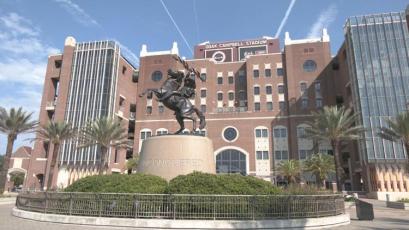
In Deuteronomy 31:6-7, Moses tells Joshua, his successor, “Be strong and courageous.” The phrase is repeated in the book Joshua, in 1 Chronicles, and again 2 Chronicles. All told, these words are restated eight times in the Bible. Clearly, God wants us to notice.
For Joshua, strength and courage had a military application as well as a spiritual one. But what might these words mean for us, in Fernandina Beach, today?
The Apostle Paul gives us a hint in 1 Corinthians. There he instructs the local church, “Be strong. Let all that you do be done in love.” In his letter to the Ephesians he says, “Be strong in the Lord, and in the strength of his might.”
Neither congregation faced a physical threat, and yet they needed inordinate strength. The reason, Paul explains, is because they were to adopt a counter-cultural and wholly counter-intuitive lifestyle. Every action, every decision, every word — spoken to friends as well as to despised enemies — was to be grounded in love. Paul knew they couldn’t do it on their own. Such a life requires “the strength of God’s might.”
These verses remind me of a couple I know who, for some 30 years, participated in the March for Life in Washington, D.C., and did so with dignity and solemnity. I think about a woman who for more than a decade went into a maximum-security prison to teach criminals how to be better dads, while confined in a federal penitentiary. I know a couple in Indianapolis who adopted two African orphans, one mentally disabled. And then made room in their small home for a local foster kid, too.
These people, and countless others, are never in the news or on social media. They’re behind the scenes, motivated by love, and trusting God for the strength to do things that don’t make sense to most people.
In our strident world, where everyone, it seems, demands that everyone else approve of my way and my values, these folks show us how — softly but courageously — we might change hearts, not just coerce behavior.
There are, surely, times to speak out. For example, the Bible wants us to notice that Jesus rarely minced words with chest-thumping religious leaders. “You Pharisees cleanse the outside of the cup of the dish, but inside you were full of greed and wickedness,” He said. Later He called them out for “load(ing) people with burdens hard to bear, and you yourselves do not touch the burdens with one of your fingers” (Luke 11:39, 46).
He routinely scolded those who should have been nurturing God’s people, but He was gentle with those who has lost their way. Reread the story of the Samaritan women at the well in John 4. Or go to Mark 7 and study how He engaged the Syrophoenician woman whose daughter had been possessed by a demon.
Then go to Paul’s letter to the Corinthians. Corinth was a port city, rough and thoroughly depraved. Christians could have railed against the wickedness all day, every day. But the thing Paul wants them to know is, “If I speak in the tongues of men and angels, but have not love, I am a noisy gong and a clanging symbol” (1 Corinthians 13:1). He also mentioned that love isn’t arrogant or rude.
Paul (and Jesus) understood that the Corinthian Church, and every early church, existed on the fringe of society. They had no political or cultural clout. To grow — to draw outsiders in — they’d have to wield the only power they had: Love.
Eusebius, an early church historian, shows us what it looks like. In the early fourth century, he explained, when famine and war afflicted the city of Caesarea, “All day long some of (the Christians) tended to the dying and to their burial, countless numbers with no one to care for them. Others gathered from all parts of the city a multitude of those withered from famine and distributed bread to them all.”
Eusebius then observed that the Christians’ “deeds were on everyone’s lips, and they glorified the God of the Christians.” That’s persuasive, culture-shaping power.
Decades later, Julian the Apostate, the last pagan emperor of Rome, was also struck by the impact of Christian compassion. “When it came about that the poor were neglected and overlooked by the (pagan) priests,” he wrote, “then I think the impious Galileans (Christians) … devoted themselves to philanthropy. (They) support not only their poor, but ours as well, all men see that our people lack aid from us.” We’re never to approve of immorality (see Psalm 51), but maybe, if we were better known for extravagant kindness, we’d change more hearts.
Richard Doster lives in Fernandina Beach with his wife, Sally. He’s the editor of byFaith, the magazine of the Presbyterian Church in America. Reach him at ddoster@icloud.com.



